Timely seminars and high level events help promote reform. Events are ordered chronologically and include an impressive number of influential speakers from around the world.
Talking Energy Subsidy Reform in Washington DC
15 April—Washington D.C.—For the fourth consecutive year, the Friends of Fossil Fuel Subsidy Reform organized a high-level event on energy subsidy reform in Washington D.C. Supported by the Global Subsidies Initiative (GSI) and co-organized with the United States and the World Bank, this year’s event was held during the International Monetary Fund (IMF) and World Bank spring meetings on 15 April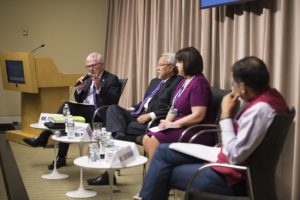 .
.
The goal of the event was to share information about recent efforts to reform fossil fuel subsidies. Panelists included finance ministers from Indonesia and Malaysia, along with Ukraine’s former finance minister and the Chief Economic Advisor of India.
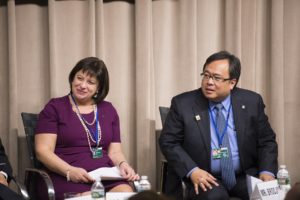 Bambang Brodjonegoro, Minister of Finance, Indonesia, underlined the hard truth that subsidies can indeed be difficult to remove once in place. Describing the implementation of Indonesia’s fuel subsidies in the early 1970s as “sensible” (due to Indonesia’s status as a net oil exporter at the time), Brodjonegoro acknowledged that it had taken Indonesia 40 years to reform its fuel subsidy regime. He also acknowledged that it had been neither an easy nor a straightforward path. Indonesia’s fuel subsidy reforms from early 2015 were closely linked to low oil prices, and prices were initially lowered in order to reflect international oil prices.
Bambang Brodjonegoro, Minister of Finance, Indonesia, underlined the hard truth that subsidies can indeed be difficult to remove once in place. Describing the implementation of Indonesia’s fuel subsidies in the early 1970s as “sensible” (due to Indonesia’s status as a net oil exporter at the time), Brodjonegoro acknowledged that it had taken Indonesia 40 years to reform its fuel subsidy regime. He also acknowledged that it had been neither an easy nor a straightforward path. Indonesia’s fuel subsidy reforms from early 2015 were closely linked to low oil prices, and prices were initially lowered in order to reflect international oil prices.
Illustrating some of the distorting effects subsidies can have on a country’s energy sector, Brodjonegoro further explained that Indonesia for a period of time had to import high-quality gasoline and subsequently lower its quality at domestic refineries in order to meet domestic demand for subsidized lower-grade gasoline. Finally, he underlined the government’s commitment to continue along the reform path and that electricity and LPG subsidies were next in line to be reformed.
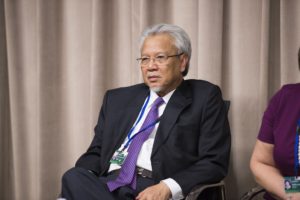 H.E. Ahmad Husni Mohamad Hanadzlad, Minister of Finance, Malaysia, conveyed a similar story of subsidies having a long lifetime once put in place. Introduced in the 1960s, Malaysia’s energy subsidies became an increasing fiscal burden over time and in line with increasing international oil prices. Malaysia managed to reform the majority of its fuel subsidies around 2010 and transition to an administratively based price system for gasoline, diesel and liquefied petroleum gas (LPG). Prices are now updated on a monthly basis. Hanadzlad further pointed to the role of subsidy reform as part of Malaysia’s successful economic transformation, bringing the poverty rate down to 0.6 per cent in 2014 and unemployment to around 3.1%.
H.E. Ahmad Husni Mohamad Hanadzlad, Minister of Finance, Malaysia, conveyed a similar story of subsidies having a long lifetime once put in place. Introduced in the 1960s, Malaysia’s energy subsidies became an increasing fiscal burden over time and in line with increasing international oil prices. Malaysia managed to reform the majority of its fuel subsidies around 2010 and transition to an administratively based price system for gasoline, diesel and liquefied petroleum gas (LPG). Prices are now updated on a monthly basis. Hanadzlad further pointed to the role of subsidy reform as part of Malaysia’s successful economic transformation, bringing the poverty rate down to 0.6 per cent in 2014 and unemployment to around 3.1%.
Successful reform implementation was accredited to good governance and the ability to demonstrate value for money to the Malaysian population. The government reforms included a huge effort to improve financial inclusion by setting up 6,000 agent banks in primarily rural areas and increase the quality of and access to education for people under 18.
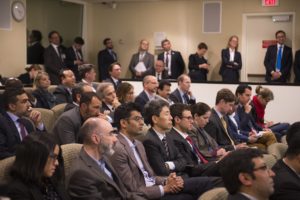 In Ukraine, Natalie Jaresko (the Finance Minister of Ukraine until 24 hours before the event), noted that some of Ukraine’s main challenges had been around two so-called subsidy myths. One myth was the belief that domestic gas was less expensive than imported gas i.e., Ukrainian gas is cheaper and should therefore cost the consumer less than imported gas. To this end, Jaresko noted that household gas prices were increased by 450 per cent as part of reform in order to reach price parity. She further noted that the same reasoning was not found to apply for other domestically produced products, only for domestic energy resources.
In Ukraine, Natalie Jaresko (the Finance Minister of Ukraine until 24 hours before the event), noted that some of Ukraine’s main challenges had been around two so-called subsidy myths. One myth was the belief that domestic gas was less expensive than imported gas i.e., Ukrainian gas is cheaper and should therefore cost the consumer less than imported gas. To this end, Jaresko noted that household gas prices were increased by 450 per cent as part of reform in order to reach price parity. She further noted that the same reasoning was not found to apply for other domestically produced products, only for domestic energy resources.
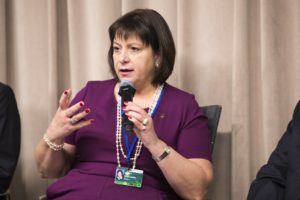 The second myth was related to people’s confidence in the Ukrainian state’s ability to actually deliver subsidies to eligible consumers after raising domestic gas prices. Some believed that even if you bothered to sign up for the new subsidy scheme, you would likely not receive the subsidy due to Ukraine’s fiscal situation. To accommodate these concerns, the government decided to simplify the subsidy application process (essentially backing away from means testing) in order to ensure people that it would in fact be worth the short time required to sign up for the subsidy scheme. According to Jaresko this—alongside a door-to-door campaign—allowed the government to increase the number of targeted subsidy recipients from 1 million in April 2015 to 5.5 million in April 2016.
The second myth was related to people’s confidence in the Ukrainian state’s ability to actually deliver subsidies to eligible consumers after raising domestic gas prices. Some believed that even if you bothered to sign up for the new subsidy scheme, you would likely not receive the subsidy due to Ukraine’s fiscal situation. To accommodate these concerns, the government decided to simplify the subsidy application process (essentially backing away from means testing) in order to ensure people that it would in fact be worth the short time required to sign up for the subsidy scheme. According to Jaresko this—alongside a door-to-door campaign—allowed the government to increase the number of targeted subsidy recipients from 1 million in April 2015 to 5.5 million in April 2016.
Finally, Jaresko highlighted the role of communications, noting that “the communications side of this [subsidy reform] is probably another lesson learned. It has to be even stronger than perhaps the financial or other parts of the programme.”
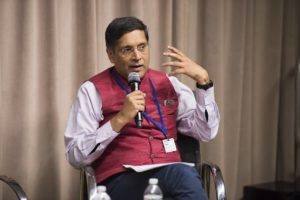 As the final panelist of the event, India’s Chief Economic Advisor Arvind Subramanian outlined India’s efforts in recent years to reform energy subsidies. Taking a gradual approach, the government has managed to remove subsidies and deregulate gasoline and diesel prices completely.
As the final panelist of the event, India’s Chief Economic Advisor Arvind Subramanian outlined India’s efforts in recent years to reform energy subsidies. Taking a gradual approach, the government has managed to remove subsidies and deregulate gasoline and diesel prices completely.
He noted that the reform of gasoline and diesel began before international oil prices started to come down, but when they did the government did not pass on all of it to consumers. Instead, the government was able to start taxing both gasoline and diesel.
Subramanian also pointed to the government’s efforts to reform LPG subsidies. Notably, the government introduced a voluntarily “Give It Up” campaign, asking consumers to give up their LPG subsidies to enable the government to support the instillation of cooking gas in poor households. According to Subramanian this has led to almost 10 million households giving up their LPG subsidies. Likewise, he noted that in April 2015 the government transitioned to a direct benefit transfer system for LPG subsidies, linking subsidy payments to individual bank accounts. 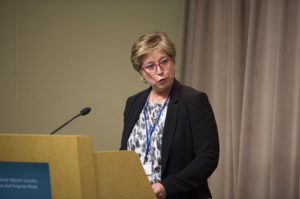
Norway’s State Secretary, Tone Skogen, provided closing remarks on behalf of the Friends of Fossil Fuel 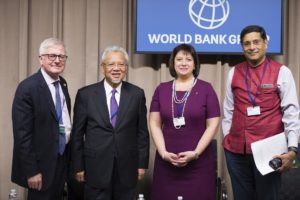 Subsidy Reform. Encouraging countries to support the Fossil Fuel Subsidy Reform Communique, Ms. Skogen pointed both to the economic benefits from fossil fuel subsidy reform and the climate change benefits expected from a removal of energy subsidies.
Subsidy Reform. Encouraging countries to support the Fossil Fuel Subsidy Reform Communique, Ms. Skogen pointed both to the economic benefits from fossil fuel subsidy reform and the climate change benefits expected from a removal of energy subsidies.
The event was moderated by New Zealand’s Ambassador to the United States, Tim Groser.